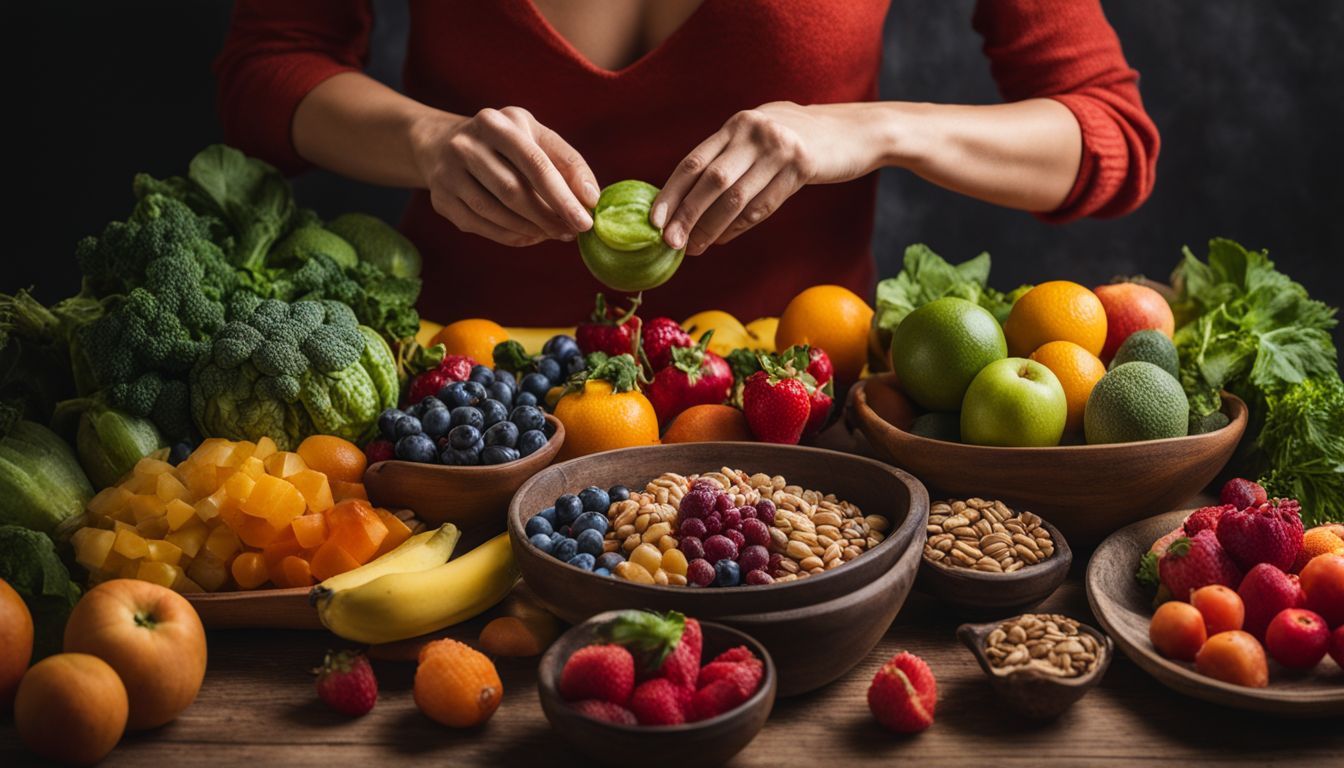

Experiencing hair loss can be frustrating. A fact worth noting is that missing certain vitamins could be the culprit behind thinning strands. This article will shed light on key nutrients your locks might be craving and how to get them back into your diet for healthier hair growth.
Keep reading; good news awaits!
Key Takeaways
- Eating foods full of vitamins D, A, C, E, Biotin, Folic Acid, and minerals like zinc and iron helps prevent hair loss. These nutrients keep your scalp healthy and support hair growth by repairing damage and creating new follicles.
- If you’re losing more hair than usual or see it getting thinner or weaker, it might be due to not having enough key vitamins and minerals in your diet. Making sure to eat a variety of nutrient-rich foods can turn this around.
- Getting enough sunlight exposure is important for vitamin D levels which benefit your hair health. Also considering supplements under a doctor’s advice can help address deficiencies leading to better hair growth.
- Symptoms like excessive shedding, thinning strands or bald patches should prompt you to consult with a healthcare provider. They can diagnose if it’s related to poor nutrition or another issue needing attention.
- Natural supplements containing essential nutrients like omega – 3 fatty acids also support strong and vibrant hair by improving scalp health and preventing breakage.
The Importance of Vitamins for Hair Health

Vitamins play a key role in keeping your hair strong and healthy. Without enough vitamins D, A, C, E, Biotin, and Folic Acid in your diet, you might notice your hair becoming duller or thinner.
These nutrients help nourish your scalp and hair follicles from the inside out. They support cell growth and repair damage caused by environmental stressors like pollution and UV rays.
Balanced nutrition that includes these essential vitamins can prevent common problems such as dryness, breakage, and slow hair growth. For example, vitamin D helps create new hair follicles where new hairs can grow.
Meanwhile, antioxidants found in vitamins C and E protect the cells in your scalp against damage. Ensuring you have enough of these nutrients is crucial for maintaining vibrant and resilient locks amid challenges like alopecia areata or female pattern baldness.
Understanding The Link Between Vitamin Deficiencies and Hair Loss

Many people experience hair thinning and shedding without realizing that a lack of key nutrients might be to blame. Essential vitamins like D, B12, iron, and zinc play crucial roles in maintaining healthy hair growth.
Without enough of these nutrients, our strands can become weak, leading to noticeable hair loss. This issue often stems from not getting a balanced diet filled with a variety of fruits, vegetables, and proteins rich in these vital components.
Making sure your meals are nutrient-dense is an important step toward keeping both your body and your hair in top condition.
Clinical trials have shown that individuals facing the challenge of thinning locks often see significant improvements after addressing their nutritional gaps. For instance, boosting intake of vitamin D through either sun exposure or dietary supplements has been linked with reduced hair shedding and thicker strands over time.
Similarly, enhancing one’s diet with foods high in B-complex vitamins or taking specific mineral supplements can turn the tide against ongoing hair loss issues. These findings highlight the direct impact our nutritional choices have on not only our overall health but also the vitality and strength of our hair.
Key Vitamins and Minerals Impacting Hair Growth
Vitamins and minerals play a crucial role in maintaining healthy hair. Learning about the vital vitamins and minerals impacting hair growth will help you make informed choices for your hair health.
To discover more about how these nutrients can benefit your hair, keep reading.
Vitamin D
Vitamin D plays a crucial role in maintaining not just bone health but also the strength and growth of hair. This fat-soluble vitamin helps in the absorption of biotin, a key nutrient for hair health, making it essential for those experiencing hair loss.
Studies have shown that low levels of Vitamin D could lead to dry, brittle strands and more shedding than usual. By boosting your intake through sunlight exposure, fatty fish like salmon, or supplements, you can help combat these symptoms.
Research links adequate Vitamin D levels with better zinc absorption and healthy iron levels in the body- two minerals important for preventing hair thinning and bald patches commonly seen in male-pattern baldness and female pattern hair loss.
For individuals noticing premature graying or an increase in hair fall, checking Vitamin D levels might be a good start towards healthier locks. Incorporating this nutrient into your diet or considering supplementation has shown promising effects on reversing some forms of alopecia.
Healthy hair starts with what we feed our body; among those nutrients, Vitamin D shines bright.
Vitamin A
Getting enough vitamin A is crucial for people experiencing hair loss. This nutrient helps keep your scalp moisturized by supporting the production of sebum, an oily substance that prevents hair from drying out and breaking.
Without enough of it, you might notice your hair getting thinner, shedding more than usual, or taking longer to grow back. It’s key in maintaining a healthy environment on your head for hairs to thrive.
Take care not to get too much vitamin A as overdoing it can have the opposite effect and lead to more loss of locks. Finding the right balance is important for fostering strong, healthy hair growth without unwanted side effects like increased flaking of skin cells on your head or even excess shedding.
Stick with recommended doses and consider consulting a healthcare provider if you’re unsure about how much you need based on dietary intake and supplements.
Vitamin E
Moving from the benefits of vitamin A to its essential counterpart, vitamin E plays a pivotal role in maintaining healthy hair growth. Rich in antioxidants, it helps combat oxidative stress and supports the overall health of hair follicles.
Spinach and almonds are potent sources of this crucial vitamin, so including them in your diet can aid in promoting hair wellness. However, it’s crucial not to overdo supplementation as excessive vitamin E intake can lead to adverse effects.
Ensuring that you maintain adequate levels of vitamin E can potentially help counteract alopecia areata by supporting the optimal conditions for healthy hair growth. Incorporating tocotrienol supplements and consuming natural food sources like fish and wheat germ can prove beneficial for your journey towards better hair health.
Vitamin C
Moving from the discussion of Vitamin E, let’s delve into the realm of Vitamin C and its influence on hair health. Vitamin C is vital in collagen production, a protein that plays a crucial role in maintaining the strength and integrity of hair follicles.
As an antioxidant, Vitamin C helps to combat oxidative stress, protecting hair cells from damage caused by free radicals.
A deficiency in Vitamin C can lead to weakened hair structure and slower growth. Including foods rich in this vitamin such as citrus fruits, strawberries, bell peppers, and leafy greens or taking a Vitamin C supplement can support overall scalp health and contribute to improved hair growth.
Folic Acid
Moving from the discussion of vitamin C, let’s delve into the important role that folic acid plays in promoting hair health. Folic acid is essential for the production of red blood cells, which transport oxygen and nutrients to the hair follicles.
This process supports healthy hair growth and helps prevent potential losses. In combination with other key vitamins and minerals, folic acid can significantly improve overall hair appearance and health.
Supplementation with folic acid can address deficiencies that might contribute to hair loss while supporting holistic hair health. It works synergistically with vitamin B7 (biotin) to maintain healthy growth, making it a vital component for anyone looking to enhance their natural locks.
Biotin
Biotin, also known as vitamin B7, plays a crucial role in maintaining healthy hair and preventing hair loss. A deficiency in biotin can lead to brittle hair and may contribute to hair thinning.
Incorporating biotin-rich foods into your diet such as eggs, nuts, and whole grains can help promote stronger and healthier hair. Additionally, taking biotin supplements or using hair care products containing biotin can support improved hair growth and overall health.
Ensuring an adequate intake of biotin is essential for preventing potential deficiencies that could impact your hair health. By incorporating biotin into your daily routine through diet or supplements, you can help maintain vibrant and robust locks while supporting optimal overall well-being.
Zinc
Zinc is crucial for preventing hair loss. Clinical practice acknowledges the concern of zinc deficiency, as it can lead to diffuse alopecia. Supplementation with zinc has shown therapeutic effects and can induce changes in serum zinc levels among alopecia patients.
Vitamin B6
Vitamin B6, also known as pyridoxine, is vital for hair health. It plays a crucial role in protein metabolism and the production of red blood cells, which are essential for delivering nutrients to the scalp and hair follicles.
This vitamin helps in maintaining healthy hair by regulating hormones that influence hair growth and preventing hair loss. Vitamin B6 deficiency can lead to reduced production of keratin, a protein critical for strong and healthy hair strands.
When addressing vitamin deficiencies impacting hair health, it’s important to recognize that each essential nutrient has its role in promoting healthy hair growth.
Iron
Iron is a vital mineral for healthy hair growth. Low iron levels have been linked to excessive hair loss in non-menopausal women and are believed to impact the growth of hair. Iron deficiency has also been associated with female pattern hair loss and chronic telogen effluvium, which causes increased shedding of hair.
Ensuring an adequate intake of iron through dietary changes or supplements can play a crucial role in maintaining healthy hair.
Iron is necessary for carrying oxygen to all cells, including those in the scalp that stimulate hair growth. An insufficient supply of iron can lead to inadequate oxygen delivery to the follicles, resulting in weakened strands and potential increased shedding.
Essential Fatty Acids
Consuming essential fatty acids is vital for maintaining healthy hair. Omega-3 supplements, like fish oil capsules, and omega-3-rich foods such as salmon, walnuts, and flaxseeds can help correct any deficiency.
These nutrients promote scalp health and improve hair elasticity, which may help reduce breakage and thinning. Incorporating these fatty acids into your diet can contribute to the overall improvement of hair’s strength and appearance.
It’s important to nurture our body with a variety of nutrients that support healthy hair growth. Essential fatty acids play a crucial role in this process by nourishing the scalp and supporting the structure of each strand.
Recognizing Symptoms of Vitamin Deficiencies

Recognizing symptoms of vitamin deficiencies: Identifying and understanding the signs. It is crucial to be aware of potential manifestations of vitamin deficiencies.
Symptoms of Vitamin D deficiency
Symptoms of Vitamin D deficiency can manifest as fatigue, muscle weakness, and bone pain. Additionally, individuals may experience symptoms such as depression and impaired wound healing.
Recognizing these signs early on is crucial for addressing the deficiency effectively and seeking appropriate guidance from a healthcare provider to improve overall health.
Next Up: Identifying Symptoms of Biotin Deficiency
Symptoms of Biotin deficiency
Biotin deficiency can cause hair loss, skin rash, and brittle nails. Individuals with this deficiency may also experience fatigue, muscle pain, and tingling in the hands and feet. Additionally, they may develop cradle cap in infants or seborrheic dermatitis in adults.
It is important to address these symptoms promptly to prevent further complications.
Understanding The Link Between Vitamin Deficiencies and Hair Loss
Symptoms of Iron deficiency
Iron deficiency can manifest in various symptoms, including fatigue, weakness, and pale skin. Additionally, individuals may experience brittle nails, shortness of breath, and dizziness as a result of depleted iron levels.
Hair loss is also a common symptom of iron deficiency and can be indicative of low iron stores in the body. Other signs to watch out for include headaches, cold hands and feet, and an inflamed or sore tongue.
It’s important to be aware of these symptoms as they could indicate an underlying issue with iron levels in the body. Seeking medical advice if experiencing these signs is crucial for proper diagnosis and treatment.
Identifying a Folic Acid deficiency
Folic acid deficiency can lead to a range of symptoms, including hair loss. Low levels of folic acid can cause poor growth and premature graying of hair. In addition to affecting hair health, this deficiency may also manifest as fatigue, weakness, and irritability.
It’s important to be aware that a lack of folic acid is associated with the reduced synthesis of DNA and RNA in the body—the building blocks essential for the growth of healthy hair follicles.
Seeking medical advice if you suspect a deficiency is crucial. A healthcare professional can assess your symptoms and run tests to determine whether low folic acid levels are contributing to your hair loss or other related symptoms.
Signs of Vitamin E deficiency
Vitamin E deficiency can cause dry, brittle hair and nails, along with hair loss. Skin issues like dryness and irritation can also be symptoms of this deficiency. If you notice these signs, it might be an indication of lacking enough vitamin E in your diet, which is crucial for maintaining healthy skin and hair.
The absence of enough vitamin E in the body may lead to lackluster hair health, resulting in noticeable changes such as dryness and brittleness in the texture of your locks and nails.
Similarly, dry skin or irritations could be a symptom indicating that adequate levels of vitamin E are not being met by your current dietary intake.
Addressing Vitamin Deficiencies for Improved Hair Health
Addressing vitamin deficiencies is crucial for improving hair health. Making dietary changes, incorporating lifestyle modifications, and considering natural supplements can support overall hair growth and strength.
Dietary Changes
To improve hair health, incorporating dietary changes is essential. Consuming a well-balanced diet rich in key vitamins and minerals such as Vitamin D, A, E, C, folic acid, biotin, zinc, B6, iron and essential fatty acids can have a positive impact on hair growth.
Including foods like leafy greens and citrus fruits for vitamin C or salmon and fortified milk for vitamin D can help address deficiencies. Additionally, increasing intake of legumes like chickpeas for iron or nuts and seeds for essential fatty acids can aid in promoting healthier hair.
Moreover including more seafood in the diet will boost the body’s levels of omega-3s which contribute to improved scalp health. By making these simple adjustments to one’s eating habits it is possible to effectively address nutritional deficiencies that may be contributing to hair loss.
Lifestyle Modifications
To support hair health, consider making lifestyle modifications. Begin by incorporating a well-rounded diet rich in essential vitamins and minerals such as vitamin D, vitamin A, vitamin E, vitamin C, folic acid, biotin, zinc, and iron.
You can also prioritize regular physical activity to reduce oxidative stress and improve blood circulation to the scalp. Moreover, managing stress levels through relaxation techniques or mindfulness practices may help promote overall wellness and consequently impact hair health positively.
In addition to dietary changes and physical activity, ensuring adequate hydration can support healthy hair growth. Proper hydration aids in delivering essential nutrients to the hair follicles while maintaining overall scalp health.
Natural Supplements
Transitioning from lifestyle modifications to natural supplements, it’s essential to consider incorporating key vitamins and minerals into your routine for improved hair health. Natural supplements like vitamin D, vitamin A, biotin, and zinc play a crucial role in promoting hair growth and preventing deficiencies that can lead to hair loss.
These supplements can be obtained through dietary changes or by consuming specific foods rich in these nutrients. It’s important to consult with a healthcare provider before initiating any supplementation regimen, as they can provide personalized guidance based on individual nutritional needs.
In addition to the recommended vitamins and minerals, essential fatty acids such as omega-3s also contribute significantly to overall scalp health and hair strength. Including natural sources of essential fatty acids in your diet or considering supplementation could potentially aid in addressing specific deficiencies contributing to poor hair health.
When to Consult a Healthcare Provider
If you notice noticeable thinning or bald patches, daily hair shedding exceeding 100-150 hairs, or persistent hair loss despite using over-the-counter remedies, it’s essential to consult a healthcare provider.
Deficiencies in vitamins and minerals leading to thinning and brittle strands also indicate the need for professional diagnosis and treatment. Low levels of crucial nutrients like vitamin D, B12, and other micronutrients in individuals with thinning hair should prompt a consultation with a healthcare provider to address these deficiencies.
Additionally, seeking advice from a doctor before taking dietary supplements is crucial for ensuring necessity and safety when addressing hair loss problems. Unhealthy hair can sometimes signal underlying health issues, making it important to seek guidance from a dermatologist who can determine the cause and recommend effective solutions.
Moving on to FAQs about best vitamins for hair loss...
FAQs
What are the best vitamins for hair loss? Learn about the role of B12 in hair loss, recommended biotin dosage for hair loss, and the potential for hair regrowth after addressing a vitamin deficiency.
Best vitamins for hair loss
Ensuring an adequate intake of essential vitamins and minerals is crucial for promoting healthy hair growth. Vitamin D, which can be obtained from sunlight exposure or supplements, plays a pivotal role in maintaining strong and resilient hair follicles.
Similarly, vitamin A aids in the production of sebum, which conditions the scalp to support healthy hair. Additionally, vitamin E contributes to improved blood circulation to the scalp, fostering an environment conducive to hair growth.
Biotin, also known as vitamin B7, is essential for synthesizing keratin – a key structural protein in our hair. This water-soluble vitamin promotes strong and lustrous locks whilst supporting overall hair health.
Moreover, zinc plays a crucial role in repairing damaged tissues and contributing to the maintenance of oil-secreting glands surrounding hair follicles.
By ensuring that these key vitamins are included in your diet or through targeted supplementation if necessary, you can actively support healthier and stronger hair growth for long-term benefits.
The role of B12 in hair loss
Vitamin B12 plays a crucial role in preventing hair loss. This essential nutrient is involved in the production of red blood cells, which transport oxygen to the scalp and hair follicles.
Without an adequate supply of B12, weak and brittle hair can result from poor blood flow to the scalp. Additionally, deficiency can lead to fatigue and weakness due to its impact on nerve function, potentially leading to stunted or premature graying of the hair.
Low levels of B12 may also hinder proper hair growth and contribute to overall declining health. To combat these effects, it’s important for individuals experiencing hair loss symptoms to ensure they are consuming sufficient amounts of vitamin B12 through their diet or supplementation regimen.
Biotin dosage for hair loss
Biotin, also known as vitamin B7, is often used as a supplement to promote hair growth and prevent hair loss. The recommended dosage of biotin for addressing hair loss is generally around 5,000 micrograms (mcg) per day.
However, it’s crucial to consult with a healthcare professional before starting biotin supplementation in order to determine the appropriate dosage for your specific needs. Moreover, excessive intake of biotin can lead to potential side effects; thus, proper consultation is essential.
When incorporating biotin supplements into your routine for healthier hair growth, consider consulting with a healthcare provider who can provide tailored guidance on the right dosage and its combination with other key vitamins and minerals that further support healthy hair growth.
Potential for hair regrowth after addressing vitamin deficiency
After addressing a vitamin deficiency, there is potential for hair regrowth. Replenishing depleted vitamin levels can lead to improvements in hair density and reduction in shedding, as revealed in clinical trials.
Dietary supplements and treatments are available to address vitamin deficiencies and promote the regrowth of hair.
Relevant Concepts: Vitamin Deficiency, Hair Regrowth
Conclusion
Understanding the impact of vitamin deficiencies on hair growth is crucial for addressing hair loss issues. Ensuring your diet includes essential vitamins and minerals such as Vitamin D, Biotin, Iron, and others can significantly improve hair health.
Recognizing symptoms of deficiencies and taking actionable steps like dietary adjustments or natural supplements are key towards combatting hair loss. Consulting a healthcare provider when necessary ensures personalized guidance in tackling any underlying vitamin deficiency related to hair health.
Ultimately, an informed approach to addressing key vitamins for hair loss contributes to healthier and stronger hair.
FAQs
1. What vitamins are crucial for preventing hair loss?
Vitamins essential for reducing hair loss include B complex vitamins, vitamin D, and vitamin C. These nutrients help in strengthening hair follicles and reducing oxidative stress that can lead to hair thinning.
2. Can iron deficiency cause hair loss?
Yes, iron deficiency anemia is a common cause of hair loss in both men and women. Iron supplements can help improve this condition by boosting the oxygen supply to your scalp and promoting healthier hair growth.
3. How does Vitamin D affect my hair health?
Low vitamin D intake has been linked to several issues like rickets and brittle bones but also contributes to conditions like androgenic alopecia. Taking vitamin D supplements helps maintain healthy follicle growth, potentially reducing the risk of losing your locks.
4. Are there any risks associated with taking too many vitamins for my hair?
While nutritional supplements can support healthy hair, excessive intake of certain vitamins, such as vitamin A or vitamin D toxicity, can have adverse effects on your overall health including your hair’s well-being.
5. Should I consult a nutritionist if I’m experiencing severe hair loss?
Consulting a nutritionist is advisable if you’re facing significant hair loss due to potential nutritional deficiencies or chronic illnesses. They can guide you on the right multivitamins or dietary changes needed based on clinical research findings.
6. Do B12 deficiency and folic acid deficiencies impact my scalp health?
Yes, a lack of B12 (vitamin B9) and insufficient folic acid levels contribute significantly to poor scalp health by causing reduced blood flow which affects the nutrient supply necessary for maintaining strong roots leading possibly towards accelerated shedding or thinning.
